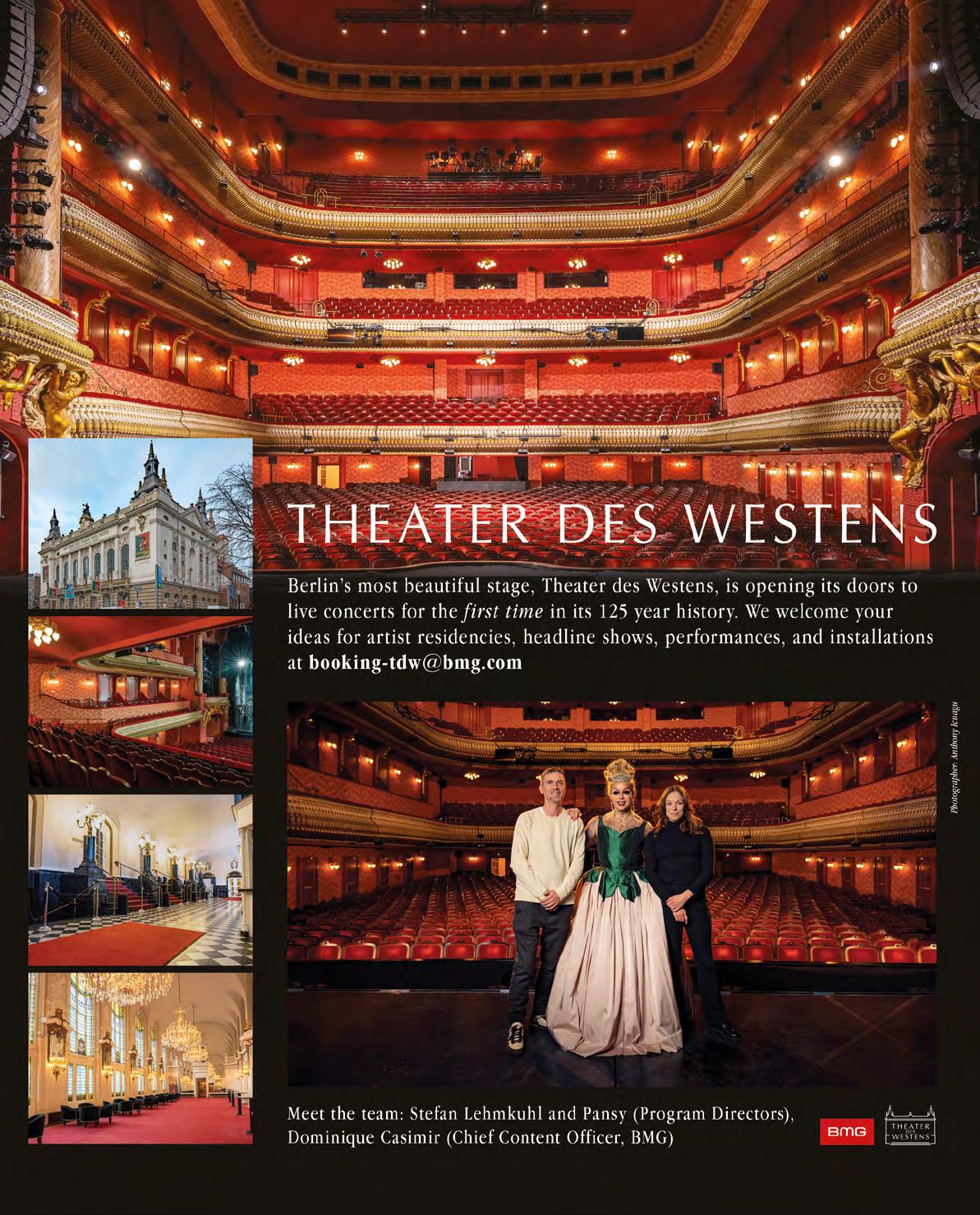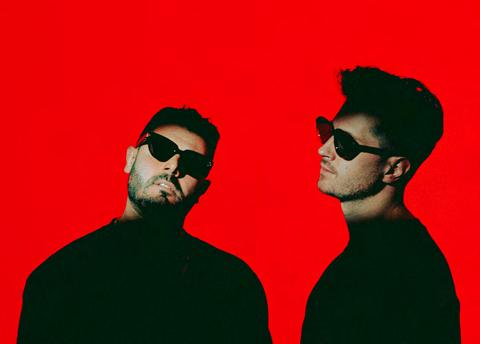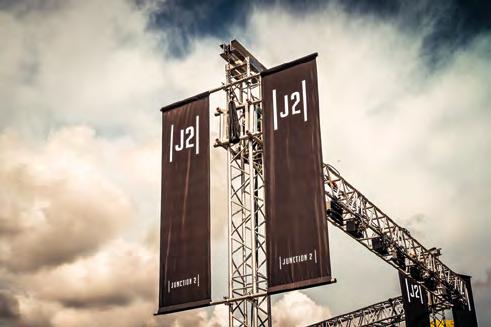












Ticketmaster reports “historically unprecedented demand” for Taylor Swift’s 2023 Eras North American stadium tour.
Danish cultural centre Kulturværftet (The Culture Yard) announces the launch of a new subscription scheme for concerts.
Madison Square Garden Entertainment files plans with the U.S. Securities and Exchange Commission to spin-off its live entertainment and MSG Networks divisions.
Music Venue Trust calls on the UK government to set up a live music commission after criticising the “missed opportunities” of the most recent budget.
CTS Eventim CEO Klaus-Peter Schulenberg says the company is going “from strength to strength” in its post-pandemic recovery.
DreamHaus CEO Matt Schwarz speaks to IQ about the company’s “hugely successful and recordbreaking” festival summer.
Slam Dunk Festival confirms it is expanding into Europe with two new rock events launching under the banner in France and Italy next summer.
Superstruct Entertainment acquires a majority stake in Derbyshire, UK’s Y Not Festival.
Live Nation chair Greg Maffei says Taylor Swift “could have filled 900 stadiums” after selling more than 2m tickets in the presale for her 2023 The Eras US tour (see page 10).
Primavera Sound director Alfonso Lanza gives IQ the lowdown on the “incredible response” to the festival’s South American debut.
Bruce Springsteen speaks out about the dynamic ticketing controversy for his 2023 tour.
Latin music executives share their 2023 forecasts, off the back of a seminal year for both the market and its homegrown stars.
Coachella ticket buyers are unable to access their tokens in the wake of the collapse of global cryptocurrency exchange FTX.
Burna Boy announces plans to become the first ever African artist to headline a UK stadium.
Christine and the Queens is announced as the curator of the Southbank Centre in London’s 2023 Meltdown Festival.
Adele expands her Las Vegas residency with the addition of two shows from 30-31 December.
UK Music publishes the results of its 2022 Workforce Diversity Survey, reporting an increase in the number of women in the business but a decrease in ethnically diverse communities.

A dispute between insurer Lloyd’s and Australia’s Subsonic relating to the festival’s 2019 cancellation goes to court.
Meta announces a virtual reality concert featuring a ‘hyper-realistic’ avatar of late rapper the Notorious B.I.G.
Prodiss joins a raft of other French industry trade bodies in pleading for no festivals to be cancelled as a result of the 2024 Olympic Games in Paris.
The fallout from the controversial presale for Taylor Swift’s 2023 stadium tour escalates, with a US Senate antitrust panel set to look into a “lack of competition in ticketing markets.”
ILMC 35 announces a unique focus on the Latin American market.
Australian music organisations welcome a pledge by the Victorian government to invest AU$34m in the state’s live music sector.
Experience curator SteppinOut hosts what it claims is the biggest festival in India in 2022.
Finland’s largest arena may be sold “very soon” after being left in limbo since Russia’s invasion of Ukraine.
A Greener Festival announces the first speakers for its Green Events and Innovations Conference, which takes place in Feb 2023.
DEAG continues to reap the rewards of its bullish M&A strategy in the third quarter of 2022, according to the company’s latest financial results.
Thousands of professionals read IQ every day. Make sure you get the whole picture…
AEG Presents UK has hired Chris Wareing and Paris Harding from SJM Concerts. Harding becomes the company’s latest promoter while Wareing takes the title of SVP for global touring.
Maciej Łaski is named the new vice-chairman at MAKiS, the operator of Atlas Arena and Widzew Stadium in Łódź, Poland. Taking over from Łukasz Minta, who has joined Live Nation Polska, Łaski was previously director of Łódź Events Center.
Holger Hohrein has been appointed as chief financial officer at CTS Eventim. He was previously chief finance officer and chief risk officer at PEAC Finance.
AEG Presents UK has announced a handful of new appointments. Jacqui Harris has been promoted to the role of VP and general manager and Lucky Thompson is named senior director, events and operations. Elsewhere, Connie Shao becomes VP and general manager for international touring; Leonie Wakeman becomes director of commercial operations; and Stuart Dorn becomes group venue operations director.
TEG-owned ticketing firm Ticketek has announced the appointment of Danny Hannaford as its UK general manager. He was most recently in charge of ticketing strategy and digital delivery for The O2 in London.
AEG Presents has named Georgie Donnelly as its first head of comedy. Previously head of comedy & podcasts at Moment House, Donnelly has also served stints as an agent at UTA and established the comedy department at Kilimanjaro Live.
TEG Europe has hired promoter Alex Simmonds as head of UK touring and special projects. He joins TEG after eight years at SJM Concerts where he booked the Country to Country (C2C) festival and worked with brands such as Disney, Studio Ghibli, BBC, Sony, and Amazon on live shows.
Solo Music Agency has named Jonathan Lomax as managing director to work across the agency and Isle of Wight festival, in the UK. Lomax joins Solo after a 20-year career running communications agencies in London.
Former Welsh Music Foundation chief John Rostron has been named as the new CEO of the
UK’s Association of Independent Festivals, replacing Paul Reed, who is joining the Musicians’ Union

Former Live Nation executive John Probyn has joined AV tech specialist Solotech. In the newly created role, he will be responsible for the business development of the firm’s touring activities in Europe.
From The Fields partnerships director Chris McCormick has been appointed as brand partnerships director for the newly formed Superstruct UK festivals brand partnerships team.
ASM Global has named Julie Driscoll, as the new CEO of Olympia London. Driscoll was most recently divisional MD for Hyve Group plc, as well as chair of the Association of Exhibition Organisers and board member of the Events Industry Alliance.
Chapman Freeborn has been managing charter flights for tours, festivals and concerts for the biggest names in the music industry for almost 50 years.
Instruments, equipment, staging, sets, musicians and crew - we are experts in getting everything and everyone where they need to be. Meet us at ILMC 35 in 2023 to discuss your music charter requirements. Make an appointment today: music@chapmanfreeborn.aero

We perform our part so you can perform yours
’s digest of executive promotions

The world has thrown up many challenges in the last few years – none more so than in the festival and live events sector.
Let’s rewind to January 2020 when the UK exited the European Union. That withdrawal triggered a multitude of different rules and regulations, saddling the UK sector with a significant amount of red tape, including the international customs document CPD Carnet. Suddenly, the free flow of music acts between the UK and the EU, as well as further afield from the US – where acts used to fly into the UK as a stop-off on the way to European festivals – was being disrupted, adding both cost and complication to live event schedules.
Then, if the post-Brexit challenge wasn’t enough to make festivals harder to organise and host, along came a global pandemic that would place the UK’s withdrawal from the EU into an entirely new light. Covid-19 had a profound effect on the sector, with national and international regulations putting a firm stop to live events, resulting in cancellations on a scale never witnessed before. Loss of income subsequently caused staff to leave the sector, resulting in shortages of skilled workers, as well as the seasonal shortages hitting the wider hospitality and leisure sectors.
While 2021 provided a Covid bounce-back for some, other festivals suffered from the return of overseas travel. Inflation and cost increases have created additional challenges, with headlines about the rising prices of festival tickets. Set against the backdrop of a cost-of-living squeeze, there are clearly limits to the costs that can be passed on. With the impact of increased red tape, prolonged periods of falling revenue, rising costs of doing business, and low reserves, many in the industry are now looking for ways to ensure future stability for their festivals.
Given the pressures facing the industry since 2020, you might expect many to hunker down and wait for the headwinds to turn in their favour. But the desire for stability has driven consolidation in the sector and created a hotbed of mergers and acquisitions (M&A) activity.
Customs clearances, queues, and costs aside, M&A is being seen as a viable way of securing the future of festivals, with collaboration helping to drive growth. This has resulted in a strong appetite across the sector.
Standout deals include the sale of UK promoter and event
organiser UK Live to Kilimanjaro Holdings Limited. The UK subsidiary of DEAG – the German live entertainment giant –acquired 90% of shares in UK Live.
In 2022, DHP Family, one of the UK’s biggest national independent promoters, bought into alternative independent music festival Bearded Theory’s Spring Gathering.
Interestingly, both deals, which BDO advised on, ensured the founders/creative drivers behind those festivals were kept at the forefront of the festival delivery, demonstrating the importance of festivals finding a home that will value their ethos and spirit and respect their history.
Traditionally, festival groups have acquired other complementary businesses to enable them to access talent and be in a position to offer multiple events/ venues to play at during any given season or year – placing them in a better position to (a) guarantee preferred artists and (b) secure better rates.
Collaboration within larger groups will of course aim to bring synergies to drive growth and reduce costs, but acquisitions are also happening due to the desire to diversify and add additional revenue streams for promoters – income via tours can be quite cyclical, as opposed to festival income which, although seasonal, happens every year. They also enable music companies or promoters to access new genres or markets.
As we near 2023, what does the following year have in store for the sector? Rebuilding, protecting, and growing the sector will be key in 2023. What’s more, festivals will continue to evolve, with technological advancement at events – from cashless systems, advanced security systems, to VR/augmented reality – together with a strong focus on [environmental, social and governance] at events and festivals, as promoters review their supply chains whilst also continually meeting changing consumer needs.
The good news is there is cautious optimism for the festival scene in 2023, as the threat of recession and softening of consumer spending potentially drives the staycation market, ensuring an active group of festival-goers are more ‘present’ than they were compared to 2022, when there was a post-Covid surge in overseas holidays/travel.
“The desire for stability has… created a hotbed of
acquisitions”
Thousands of professionals read IQ every day. Make sure you get the whole picture…
Since bursting onto the scene with their acclaimed debut album Black Holes, The Blue Stones have delivered a crowd-thrilling live show that they say, “defies the laws of physics,” generating a massive sound from its two members alone.

On their third album, Pretty Monster, the duo fully captures the controlled chaos and combustible energy of their live set for the very first time—all while expanding on the potent song writing and sonic ingenuity shown on Black Holes and its 2021 follow-up Hidden Gems.

Despite the colossal growth they’ve experienced since their start playing dive bars in their hometown, the duo instils every track with unchecked passion and a joyfully adventurous spirit. Pretty Monster came to life at an off-the-grid studio in Kingston, Ontario. Lead vocalist/guitarist Tarek Jafar and drummer/backing vocalist Justin Tessier worked tirelessly on preserving the raw vitality of the album’s demos while embedding each song with so many unexpected details. A striking departure from the more atmospheric sound of Hidden Gems, the result is a triumphant body of work that merges the core dynamics of rock & roll with the indelibly catchy hooks of pop.
With a back catalogue as Boom Bip, plus another two as one half of electronic pop duo Neon Neon, Bryan Hollon has already made a name for himself as a Mercury prize-nominated producer and multi-instrumentalist. Equally impressive are the credits to Warpaint drummer Stella Mozgawa’s name; she’s contributed percussion to albums by Kurt Vile, Cate le Bon, Courtney Barnett, Sharon Van Etten, and Kim Gordon, among others. But as improvisational techno duo Belief, the pair make music that harkens back to ‘90s acts like LFO and 808 State – artists that indelibly, but near-anonymously, altered club and rave culture, mostly identifiable by clean, bold logos on 12” sleeves.
Governed by the central question – “What would Mark Bell do?” – Belief pays homage to the pioneers of techno, while deferring to their own instincts and experiences to avoid creating anything too derivative. Instead, born out of an oddly divine foresight the duo share, they’re adding their own creative mark on the music that initially drew them together, ultimately gracing the musical universe with the synergy of two devout tastemakers building a shrine to inner peace and outward pleasure.
Thousands of professionals read IQ every day. Make sure you get the whole picture…
Tracking the acts that have found representation at booking agencies around the world.AGENT Jamie Wade | X-ray Touring AGENT Ben Haslett | Earth Agency © Nick Fancher
With more live music professionals expected than ever, we’re introducing a major new feature at ILMC in 2023.







Wednesday evening will see the launch of London Calling, a first-of-its-kind, central London showcase










The first speakers and chairs for ILMC 35 are in place, with many more to be announced over the coming weeks. And with previews of much of the conference’s agenda published on 35.ilmc.com, the 2023 edition is shaping up fast.
To celebrate the explosive growth of Latino artists over the past couple of years, ILMC is shining a unique spotlight on the Latin American market at our gathering in March, supported by many of the region’s top companies and professionals, all under





With millions of tickets sold, never-seen-before production elements, and a schedule which has seen him set records throughout Europe, Ed Sheeran’s + – = ÷ × tour was the runaway winner of IQ’s Tour of the Year Award for 2022. Derek Robertson speaks to some of the dedicated army of professionals who helped Sheeran realise his artistic ambitions.

All photography © Ralph Larmann



sector of the business.
In the first of a regular series of forward-looking articles, IQ talks to some of the architects who are helping to shape the industry of the future, to quiz them on their blueprints and predictions for how we may all be operating in a few years’ time.
“The idea that the live music industry is about to be ‘disrupted’ is total nonsense. The metaverse is a new tool to extend its capabilities”

You have an international reputation for technology journalism. How do you see various tech breakthroughs coming together to improve live events in the future?
The metaverse isn’t just one form of technology. It’s the amalgamation of a series of technologies. I think we’ll look back on this period as a really magical time, where the convergence of Web3, VR/AR, cloud computing, etc, reshaped the world.
The aha moment for me was the first time I saw Miro Shot perform their mixed-reality concert in Paris, blending gaming tech and virtual worlds in a genuinely powerful and credible live experience. The show stood out because it wasn't about some kind of novelty technology. At its core
it was a live concert, with that magical connection you get from being in a space with an artist performing. It was one of the key inspirations for me to launch Ristband. We spent a lot of time experimenting with different ways of capturing the excitement and energy of a live performance, but it quickly became apparent that trying to ‘simulate’ a concert would be a waste of time because nothing will ever compare to it. But the question is, “Why do hundreds of thousands of people watch Glastonbury on TV? Why do people who are not in a stadium still enjoy the World Cup? And more to the point, how can we harness the possibilities of these emerging technologies and fuse them with the core of what a concert is? This is the code that Ristband is trying to crack.
The live music industry operates on slim profit margins. Are there additional revenue streams that the business is missing out on by ignoring metaverse opportunities? Absolutely. Live music is incredibly expensive to put on – the logistics of huge gatherings of people, security, health & safety, legal implications, lighting rigs, backlines, and transportation costs. The advantage of operating in a virtual world is that these overheads are dramatically reduced. To reiterate, this isn’t about replacing live events. However, being able to exist in the physical and virtual world simultaneously represents a huge untapped revenue stream for the live music industry and artists in general, not to mention other positive aspects such as sustainability and accessibility.
The revenue models of the metaverse are also familiar extensions of the models that already exist in the real world, such as ticketing, merchandising, and memorabilia, combined with revenue models of the gaming industry that churn out mind-blowing returns that have previously been inaccessible to the live music industry.
For example, digital goods offer an amazing extension of the merchandising business. Travis Scott reportedly earned over $20m in revenue from digital merchandise sales for a single concert in Fortnite, in comparison to the $1.7m he made from a single night for his Astroworld tour. This is just a small fraction of the revenue opportunity that’s available. In 2021 alone, over $100bn was spent on in-game digital assets.
What is new here, is how these models are applied in the emergent metaverse where, for the first time, music and gaming culture are colliding en-masse. At the centre of it all is a shared fandom and love for music with a new generation of fans who crave new experiences – an opportunity that cannot be ignored.
The likes of livestreaming and metaverse platforms offer fans who, for whatever reason, cannot attend live shows an ideal way to connect with their favourite acts. How do you see the metaverse developing in terms of concerts in the next five years?
Approaching the music metaverse from a music industry perspective, it was clear that no one in the tech and gaming space had spoken to artists, booking agents, promoters, or the music industry as a whole. We wanted to build a tool that focused on the way people who work in music discover, nurture, and promote music to help artists reach the audiences they deserve.
Ever-changing best practice and technological innovation are impacting the live music industry like never before, while important issues such as diversity, equality, and sustainability are being embraced by every
Our early stages of R&D were about working out how we could use the granular data insights the metaverse offers to help artists and their teams find ways to use the metaverse in a practical sense. The idea that the live music industry is about to be ‘disrupted’ is total nonsense. The metaverse is a new tool to extend its capabilities.
We’re in the earliest stages of music in the metaverse, and also the metaverse itself, and what we’re noticing is that it’s actually the merging of music culture and gaming culture to create something entirely new. It's not just a game, and it's also not just a concert. The world is changing, and the industry is adapting.
How can Ristband help in the development of emerging talent to help create the next generation of headline acts?
Very early on, we realised that live venues and festivals are dramatically underserved by the technology and gaming industries. We experienced this first-hand when we showcased unsigned artists at our launch at the SXSW music festival this year, where 23-times the number of physical attendees joined remotely in Ristband.
More broadly, we’re also seeing kids who grew up on Roblox, Fortnite, and Minecraft looking for what’s next in popular culture. It’s natural they’re looking for the next step in music culture in virtual worlds, and this is where there’s a huge opportunity for the music industry to capture market value and for emerging acts to hone their skills, build their audience, and get discovered.
Take Splash, for example, a Roblox game that 21m kids had played by 2020, each making use of an in-world tool to create a track and then getting in line to perform on a digital stage. While kids in Roblox aren’t yet the age group for going out to experience live music (the majority are under the age of 16), these kids are already making music, performing, and playing games. They are the next generation of fans, and some of them will go on to build successful careers touring stages and festivals in the real world.
In the same way that Internet culture transformed the music industry, immersive virtual worlds are bringing an entirely new dynamic to what it means to be a music fan, artist, or industry professional.
Long term, how different do you think the live music business will operate compared to how it does now?
There are lots of exciting approaches and innovations in the metaverse and Web3. It’s not just about artists getting paid the maximum amount, it means agents and promoters can operate more efficiently and artist discovery becomes more authentic.
As much as these emergent approaches and technologies are exciting, we have yet to see a solution that is genuinely efficient, effective, and profitable. The future of the music industry, the metaverse, and music culture itself will not be decided by a technology company or based on hype or votes, it will be dictated by the same energy that has guided the music industry since the beginning: song writing, incredible live concerts, and the profound connection that is shared between a fan and their favourite artist as they walk onstage for the concert of a lifetime.
Anne McKinnon is co-founder and CEO of Ristband, a metaverse platform for creators.
How do you see the touring landscape changing globally in the next couple of years, now that we’re in a post-pandemic environment?
We’ll continue to see artists doing more shows across the globe, and all signs point to the fan demand being there to account for that. Touring has always been a significant part of an artist’s career and a key way they connect with their fans at every level and across all genres of music.
With recession looming in many markets and inflation spiralling, a cost-of-living crisis seems like the latest challenge that live music will have to deal with. How can agents, promoters, and artists work together to try to keep tickets affordable for fans?
As the promoter, we work closely with artists and their teams to develop strategies that meet their touring goals from the vision of the show to the financials, which includes how the artist wants to ticket and price their shows. We also pride ourselves on the knowledge we have of markets across the globe and the research we do to make sure ticket prices are comparable and make sense for the fans and artists.
How do you predict the global touring business will develop in the coming decade, and what impact do you think technology will play in the way fans interact with artists?
We’re already seeing technology connect artists with more fans around the world than ever before through their social platforms and streaming, which gives them a bigger fan base to bring shows to. The average global tour has continued to trend upwards in number of stops, and we anticipate that will only continue over the coming decade. Another great example is how stage production is advancing with technology and becoming even more impressive. We’ll continue to see tech make all aspects of the fan experience more simple and convenient, and on a global scale.
What more can be done to support the next generation of headliners, as well as those career acts who rely on their live work to make ends meet?
From my perspective, up-and-coming acts and younger artists are gaining momentum faster than ever before. Due to streaming platforms and social media channels like TikTok, artists have a much greater reach and better opportunity to grow their fanbase at a rapid pace.
For other emerging artists, it is about hitting all of the steps from the beginning and connecting with fans. Playing the clubs and smaller rooms for your day-one listeners, playing festivals to reach new fans and different audiences, and building those up to hit the bigger rooms like arenas. I’ve had the privilege of seeing it first-hand in artists like Billie Eilish who catapulted and Lizzo who dug in and worked the small rooms to the theatres and is now headlining arenas.
Lesley Olenik is vice president of touring for Live Nation.
Thousands of professionals read IQ every day. Make sure you get the whole picture…

“The average global tour has continued to trend upwards in number of stops, and we anticipate that will only continue over the coming decade”

Starting off life on the road as a dancer, Nicole Massey’s career is as varied as it is fascinating, with her multitasking skills playing a major part in her climb to the top of the production ladder. Our latest winner of The Gaffer Award for production excellence talks to Gordon Masson about
As the production manager for Billie Eilish, Nicole Massey has become one of the most high-profile roadies in the world, thanks in no small part to presenting the young star to an audience of millions at The Grammys this year.

Her résumé includes working with some of the biggest stars to ever grace the stage –Coldplay, Beyoncé, Madonna, Prince, Rod Stewart, and Van Halen, to name but a few. But it was the Divine Miss M who first ignited Nicole’s passion for touring, while her insatiable desire to learn new skills has seen her seamlessly switch
roles from performer to production guru.
Unlike some of her peers who fell into the production sector, Nicole’s fate seemed sealed from the start. “My parents met while working on a theatrical production, so you could say it’s in my blood,” she reveals. Indeed, the smell of the greasepaint has never been far away. “I was a dancer and performer from a really early age – I was always being excused from school to go to New York for some audition or another,” she recalls.
Raised in the city of Lancaster, Pennsylvania – in the same county as global production hub, Lititz – Nicole was given free rein to exercise her imagination, as her parents could obviously see
where her natural talent might take her. “They encouraged my creativity. I had imaginary friends as a child – Shamen, Camen, and Amy –who we would pick up on the side of the road on car journeys. My sister’s friends would be wondering what on earth we were doing, but it was a regular thing,” she laughs.
Growing up surrounded by adult actors and performers may have helped instil self-confidence in the young Nicole, too, because when she had the chance to compete for a dance scholarship across the country in Dallas, Texas, she persuaded her parents to let her undertake the trip on her own. Needless to say, she won the scholarship.
her professional path and her hopes to see more women attaining positions of power in live music.





Spain’s ascension in the global live music league table, pre-Covid, was impressive. Now, with the market fully reopen, its live music professionals have been quick to re-establish that momentum, with new events and venues being launched and some of the most ambitious promoters on the planet driving international growth. Adam Woods reports.
In quick succession, around a month before Christmas, Spain’s leading festivals laid their claim to a share of what should, world events permitting, be another boom summer for live music.
Primavera Sound, with its mirror festivals in Barcelona and Madrid, showed its hand first, with a two-weekend bill featuring Blur, Halsey, Kendrick Lamar, Depeche Mode, Calvin Harris, local/global star Rosalía – and the list went on. Then came the sixth edition of Madrid’s Mad Cool, with Red Hot Chili Peppers, Liam Gallagher, Sam
Smith, Lil Nas X, Robbie Williams, Lizzo, and others.
The message from Spain was clear: even in the teeth of a recession, a war in Europe and a pandemic hangover, all the big guns are going to be firing next summer, just as they did in 2022.
The shape of these past three years in Spain, of course, was the same as everywhere else: mountains of cancelled shows in the first two years of Covid, then mountains of rescheduled ones in the third. There are storm clouds on the global horizon, but there are also epiphanies from the watershed summer of 2022.
Sant Feliu de Guíxols
Festival de la Porta Ferrada
Sant Pere de Ribes
InMusic/Showatac
Santander
Escenario Santander
Santander Music
Santiago de Compostela
Capitol
O Son de Camino
Seville
Flamenco Agency
Custom
Icónica Fest
Valencia
Music Community
Music Republic
Serious Fan Music
Tebar Asociados / Jazzspain 98
Fresquito Jazz
La Bikina
La Rambleta
Loco Club
Repvblicca
Roig Arena (2024)
Medusa Sunbeach
Vigo
Auditorio De Vigo
Vilanova i La Geltru
Vida
Villarrobledo
ViñaRock
Vitoria-Gasteiz
Jimmy Jazz
Fernando Buesa Arena
Azkena Rock
Vitoria-Gasteiz Jazz
Zaragoza
Get In
Kursaal
San Sebastian Jazz
Just Life Music
Siamm Producciones
Mundial Sport
Rock & Blues
Teatro Las Esquina
Thousands of professionals read IQ every day. Make sure you get the whole picture…




